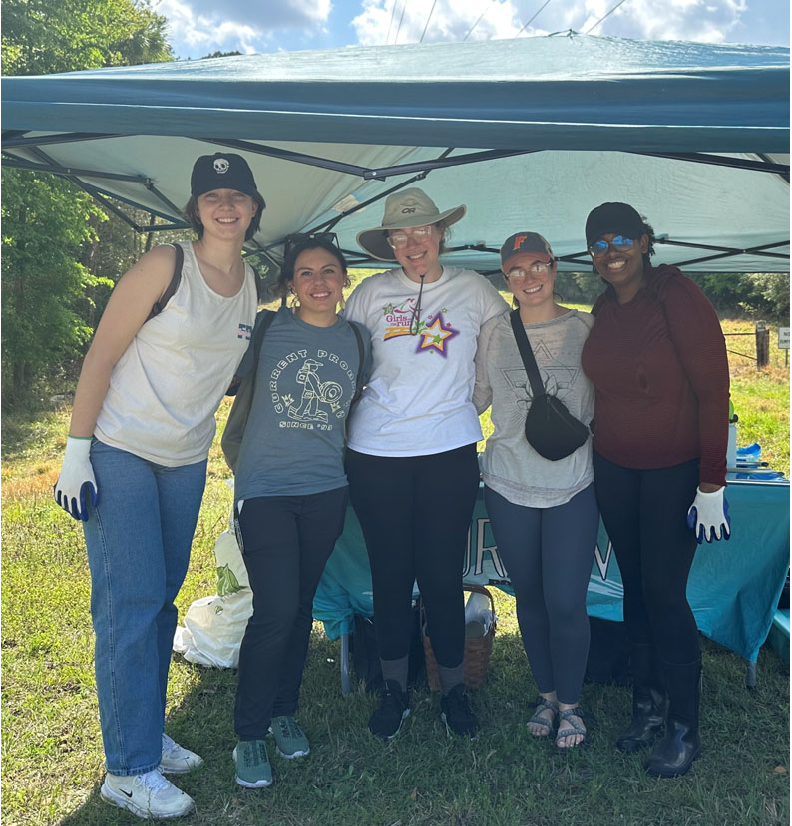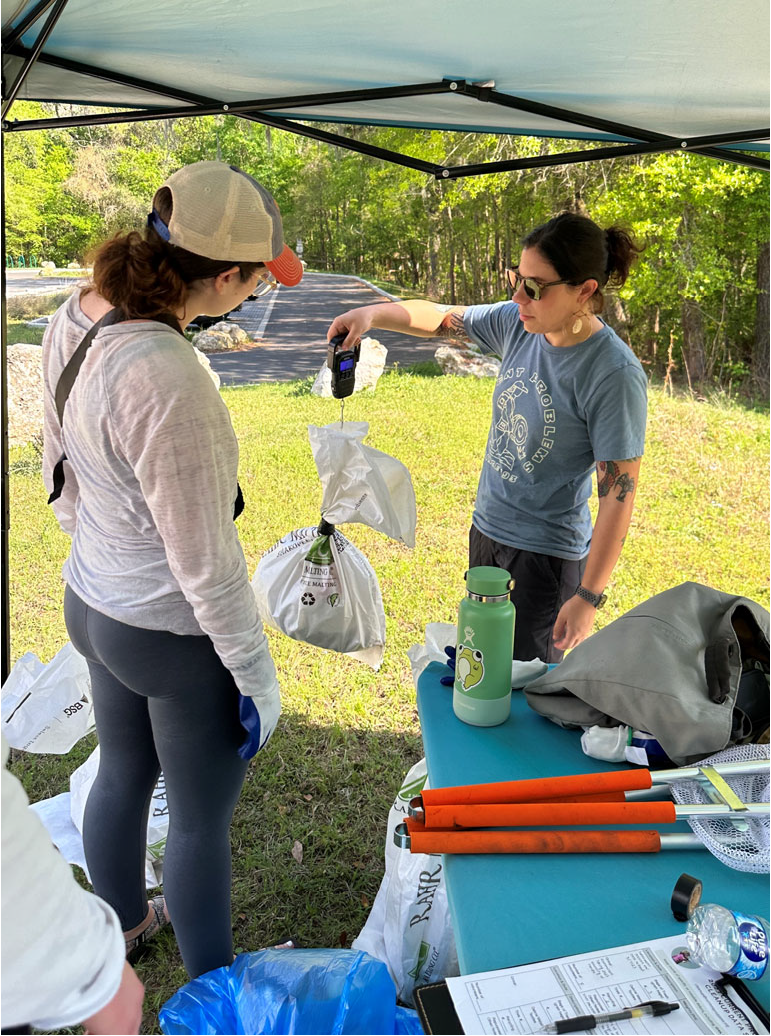Noelle Mercer, a Psychology major and Women’s Studies minor student of the class of 2023, reflects on the experiential learning activity from WST 4349, Ecofeminism.

Our ecofeminism class partnered with the nonprofit Current Problems, the sole organization of its kind in the Southeast that is working to reduce waste in waterways “at its source” and prevent widespread marine pollution. The organization is celebrating its 30-year anniversary in 2023 and has removed 1,002,848 pounds of waste during its time. Current Problems is directed by Nicole Llinás, who we worked with during our clean-up. The effort began with Nicole explaining the ways that freshwater systems work in Florida, emphasizing the importance of protecting our overexploited Floridan aquifer. She further noted that by cleaning up debris in creeks, we prevent larger-scale marine pollution in Florida. The most striking idea that Nicole brought up is that corporations put the blame for pollution on the general population by using the term “litter.” These companies place plastic and pollutants in consumers’ hands, yet pollution is framed as the consumer’s fault. I had never been exposed to this way of thinking before, yet it makes sense.
A common theme in ecofeminism is that women are disproportionately impacted by environmental destruction. The domination of nature is intimately connected to the domination of women. This clean-up was unique in that the crew was made entirely of women. I have been in very few spaces in my college experience that are facilitated and attended exclusively by women. The camaraderie and unspoken understanding in these spaces is always refreshing to experience. All of us have an education in women’s studies, and we spoke about related global issues as we picked up shards of glass by the creek and grimaced at abandoned bags of dog waste. It felt distinct from other environmental conservation efforts I have been a part of – we all shared the understanding that we were benefiting others like us, and one of our primary motivations was environmental justice. While conservation is important to all of us, we also recognize the intersections that exist between environmental and community health. There were only six of us, yet we managed to gather nearly 15 pounds of waste within a couple of hours. It might seem like a meager number, but we did that work with our own two hands. I picked up glass, trash, and plastic that otherwise would still be sitting in the creek bed or beside growing plants. There is an empowerment in knowing that you dedicated personal time to the betterment of your community (and that the 25 mosquito bites on your legs were for a good cause). This work is for those around us, an homage to women working around the world with their natural resources.
“The texture and profound impact of these [experiential learning] experiences for students is difficult to capture in the institutions spreadsheets and metric generation efforts.” -Dr. Bonnie Moradi

I also learned more about Florida’s natural environment. Nicole showed us an invasive plant and how to pick off its berries to prevent further pollination. She even fully uprooted the large bush without a shovel, to the amazement of the group. Having a sharp eye for hidden treasures (and trash) within the forest, she spotted a freshwater snake species coiled up off the trail. These are elements of the environment that I would have passed over otherwise. This clean up served not only to volunteer, but as a mindfulness practice that many could benefit from. I would recommend working with Current Problems to anyone invested in the environment, sustainability, and the people around them. These issues are so much deeper than keeping our waterways clean. It is a way to pay back to the “Mother Earth” who provides for all of us, a direct defiance to a society that values individuality over the collective and places the feminine below the masculine. In our class, we discussed the implications of using feminine language to describe nature. The term “mother” for Earth emphasizes the nurturing aspects of our environment. However, this title connects the domination and exploitation of nature to this feminine figure of the mother. My group analyzed how this association implicitly condones the exploitation of women at large, as we normalize this pattern through our language. By working with Current Problems, the team was able to remedy this negative association in a small yet powerful way. We chose to take care of “Mother Earth,” showing a reverence for the world around us by creating a reciprocal relationship between humans and nature. Nature provides for us, so we must provide for nature.
This experience brought tangible action to the topics we discussed over the semester. Overall, volunteering with Current Problems was an eye-opening experience for me, and I’m glad that I didn’t shy away from walking through the forest at 3 P.M. on a Tuesday (but maybe next time I’ll bring bug spray to avoid the mosquito bites).